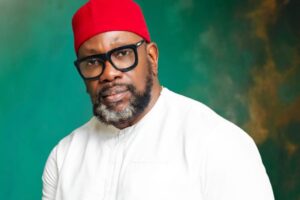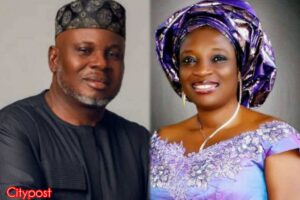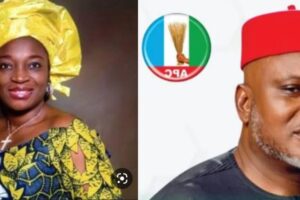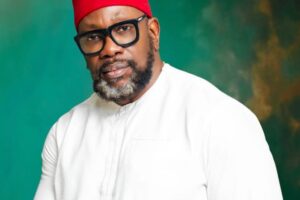
By Dennis Naku
DENNIS NAKU reports on the latest power struggle between the Minister of the Federal Capital Territory, Nyesom Wike, and Rivers State Governor, Siminalayi Fubara, over the political control of the state, following the collapse of the peace deal facilitated by President Bola Tinubu and the efforts by the duo to strengthen their respective support bases in the state
IN the run-up to the 2023 general elections, the relationship between Nyesom Wike, then governor of Rivers State and Siminalayi Fubara, the state Accountant-General, as he then was, was like that of a father and son.
Wike, at the twilight of his administration, did everything to ensure that he installed a loyal successor, which he found in Fubara, against the wishes of many party bigwigs and faithful in the state, who argued that the latter, being a political rookie and having not contributed anything to the Peoples Democratic Party, should not have been given the plum job.
Wike, however, appealed to the heavyweights to accept Fubara for reasons best known to him. His plea was received with mixed feelings among party men and women, especially among the majority of the aspirants seeking the party’s ticket ahead of the election.
The likes of former governor of the state, Celestine Omehia, erstwhile deputy governor, Tele Ikuru, former Minister of Transport, Dr Abiye Sekibo, former Deputy Speaker of the House of Representatives, Chief Austin Opara, Senator Lee Maeba, among others, were party stalwarts Wike locked horns with and stepped on their toes before having his way, causing a major crack in the party fold.
Even before Fubara was declared winner of the primary, it was said that some of the aspirants, including Dr Sekibo, in objection, walked out of the Dr Obi Wali International Conference Centre, the venue of the exercise where Fubara was elected as the party’s standard-bearer.
One of the fallouts of the disagreement was that Dr Sekibo, Senator Maeba, and Chief Opara, who were governorship aspirants of the party, along with Sir Omehia and other chieftains of the party, like former Commissioner for Employment and Economic Generation, Dr Leloonu Nwibubasa, turned their backs on Wike.
Needless to say, the aggrieved party stalwarts also opposed the group of five governors, known as the G-5, aka Integrity Group, led by Wike, who rejected the Peoples Democratic Party presidential candidate and former vice president, Atiku Abubakar, as the political permutations then gathered momentum for the poll.
While Wike saw them as state enemies for aligning with Atiku, one of them and former senator, Maeba, voiced his concerns bluntly thus, “A candidate has emerged for our party. So we don’t need anybody to tell us who to support for the president in the coming election. What we should do is to come together and support the candidate that has emerged.”
Fubara contested the election, won by a landslide and was sworn in as governor in a well-attended ceremony, held at the Yakubu Gowon Stadium, Elekahia, in Port Harcourt, on May 29, 2023, after Wike had handed over state power and authority to him in the public glare.
Within the first three to four months of the new administration, things were going smoothly between the godfather, Wike, and his godson, Fubara, until somewhere down the line, when some strange developments were noticed.
Like a bolt from the blues, Wike and Fubara were no longer seen together exchanging the usual banters, even at important state functions. Tongues started wagging and, as it is said, the walls have ears, so that from within there were whispers that the house was falling.
Noticeably among the cracks in the wall was the former governor ensuring that four commissioners – Works, Education, Attorney-General/Justice, and Finance, who worked under him when he held sway, were reappointed and assigned the same portfolios by his successor.
Subsequent appointments of commissioners were, according to the ‘whispers,’ determined by Wike, while the incumbent governor was limited to appointing special advisers and related aides, coupled with the fact that he hardly took any major decision without the express approval of his predecessor, which he (Fubara) began to find nauseating.
An elder statesman and pioneer spokesperson of the Pan Niger Delta Forum, High Chief Anabs Sara-Igbe, during an interview with The PUNCH correspondent, bare it that Governor Fubara had expressed worry over the trend and had dared to resign from office following the high-handedness of his predecessor, which he considered a mouthful.
In search of a breath of fresh air, Fubara resorted to relating his travails to some top politicians, including known political foes of his predecessor and followed it up with a private visit to Governor Douye Diri of Bayelsa State in Yenagoa, and his Edo State counterpart, Governor Godwin Obaseki in Benin.
Again, it was said that Governor Fubara, against his godfather’s advice, started attending PDP stakeholders’ meetings outside the state and interacted with bigwigs and heavyweights, a development that Wike neither found funny nor palatable.
The result was the commencement of the moves to unseat the governor, who was barely six months in office, by the state House of Assembly, led by Wike’s kinsman from Obio/Akpor Local Government Area, Martin Amaewhule.
After the move to impeach the governor failed, Wike, who was already the Minister of the Federal Capital Territory, himself had alleged that there was a move by Fubara to change the leadership of the state legislature and install one loyal to him in a bold effort to start building his political structure as a sitting state chief executive.
“You want to remove an Obio/Akpor man, you will go first,” Wike was quoted as saying during one of his famous outings in the media.
While the unfolding political drama had set the stage for 27 members of the state House of Assembly loyal to the FCT minister to execute their plan, the night before the planned impeachment proceeding, precisely on October 30, 2023, an explosion rocked the state House of Assembly and destroyed the hallowed chamber.
Not deterred, the 27 lawmakers went into the bombed chamber under heavy security and announced a notice of impeachment against the governor, who demanded to know the sin he committed to warrant the plan by the lawmakers, amid all the hullabaloo and pandemonium that occurred, including teargas and water shelling on Fubara.
According to Newton’s Third Law of Motion, ‘every action has an equal and opposite reaction’. A day after, on December 13, 2023, Governor Fubara supervised the demolition of the imposing Assembly complex with several earthmoving equipment and the complex has since then been under lock and key to date.
Justifying the demolition, the state Commissioner for Information and Communications, Joseph Johnson, at a news briefing in his office, said the facility had integrity issues, made worse by the bombing, adding that engineers had advised that the facility was no longer safe for legislative business due to the structural defects.
During the melee, former House Leader, Edison Ehie, who had earlier been removed and suspended, claimed that he had been elected Speaker by his colleagues and announced the suspension of some of his colleagues, including Martin Amaewhule.
A few days afterwards, Fubara presented an appropriation bill of over N800bn to four members of the state Assembly loyal to him at the Government House, Port Harcourt and 24 hours after, the bill was passed into law and assented to by the governor, going down in the annals of democracy as the fastest in the country.
In the heat of the political crisis, President Bola Tinubu stepped in and intervened, inviting warring parties to Abuja, a development which culminated in an eight-point peace agreement, which directed Fubara to represent the budget to the whole House and reappoint about nine commissioners loyal to Wike who had resigned from his cabinet in the wake of the faceoff between godfather and godson.
Back home and across the country, the presidential truce was greeted with disapproval and outright rejection by a plethora of Governor Fubara’s supporters, including the Rivers State Council of Elders. However, amid several youth and group protests, Fubara pledged his commitment to implementing the agreement, saying, “It is not a death sentence,” though Rivers’ elders argued that it was.
The governor went ahead and fulfilled almost all the terms of the Abuja peace agreements, including payment of allowances due to the lawmakers and reinstating the resigned pro-Wike commissioners.
However, the governor had yet to represent the budget to the Amaewhule-led Assembly, the centre of a lingering faceoff with the majority lawmakers and the state caretaker committee of the All Progressives Congress, led by Chief Tony Okocha.
Chief Okocha had, at a media interaction, said, “The governor cannot be cherry-picking which agreement to implement when he appended his signature to the document before Mr President.”
On December 22, a mother-of-all-all protest by various groups, including the Ijaw National Congress, led by its President, Prof Benjamin Okaba, the Ijaw Youths Council, Eastern zone, the Nigeria Labour Congress, Rivers State branch, National Youths Council of Nigeria and the National Association of Nigerian Students, South-South zone, grounded the state with a clear message of rejecting the presidential peace agreement, which they said favoured Wike.
One of the leaders of the protesters and the state chairman of the NYCN, Chijioke Ihunwo, put it succinctly thus, “We reject the eight-point agenda because it was not written by Rivers people who gave the governor their mandate. We, therefore, warn that if the governor makes the mistake of trying to represent the budget, we will occupy the Government House.”
While the issues of representing the budget, the status of the lawmakers and the presidential intervention are currently before the court awaiting adjudication, Governor Fubara, at a recent public function, reiterated his commitment to the peace accord, saying his honest decision to implement the pact was because of his respect for President Tinubu.
Fubara stated, “Mr President invited all the parties to Abuja and came out with a resolution that we should go and implement. That resolution, I am implementing. It is not a constitutional implementation. It is a political solution to a problem. And I’m doing it out of the respect I have for Mr President.”
He, however, warned that he would surprise those who thought his decision to implement the agreement was a sign of weakness.
In analysing the political situation, some pundits said Fubara’s refusal to represent the budget was in order, emphasising that it would be a grave tactical error for him to do so. They further averred that Fubara would be stepping on a minefield planted by the pro-Wike lawmakers to enable them to finally nail him if he attempted to represent the budget.
But be that as it may, the recent outburst of the FCT minister ruling out any reconciliation with his estranged political godson seems to sound the death knell on any hope of reconciliation between the duo. This was just as Fubara himself was proving to be a good student of diplomacy, preaching peace and practising war.
But the pro-Wike lawmakers are not backing down, as they have vetoed the governor to amend some extant laws in the state, including the Rivers State Local Government Law, the state Advertising and Signage Law and the Rivers State Assembly Commission Law, which limits the powers of the governor in more ways than one if allowed to sail through
Only recently, on March 30 precisely, the 27 lawmakers threatened Governor Fubara with impeachment, saying they would be compelled to do so as a last resort if it would take to enforce their responsibilities and uphold the constitution of the land.
Speaker Amaewhule, flanked by 26 of his colleagues, while issuing the threat at a news briefing at his official residence, accused the governor of refusing to implement all the agreements reached in Abuja, adding that he (Fubara) had continued to act outside the law, including running the state without an approved budget.
Amaewhule also took a swipe at the former Director General of the PDP Presidential Campaign Council in the state, Dr Abiye Sekibo, for casting aspersions on the FCT minister in a bid to paint him black before President Tinubu, knowing well that the president is happy with the good works Wike is doing in Abuja.
Speaking directly to Dr Sekibo and his pro-Atiku supporters, he said, “They must not forget that the Rivers State House of Assembly has the mandate of the people and that we swore an oath of allegiance to the constitution to do the needful, including the impeachment of the governor as a last resort.”
There is no gainsaying the fact that in the coming weeks and months, it will be needless to peep into the star to predict the impending outcome of the political imbroglio in Rivers State. It is also an open secret that as of today, the Abuja peace agreement, which led to a semblance of temporary peace (of the graveyard) in the state, had crumbled.
Though Fubara has been talking tough lately, acting with aplomb and gaining the support of many stakeholders, a cursory look shows that Wike still holds the aces, as he still controls the political structure, especially of the PDP in the state.
The former governor still commands the loyalty of all chairmen of the 23 local government areas of the state, who were elected during his tenure as governor. Similarly, the three senators, including Senator Barry Mpigi of the Rivers South-East, the district of the incumbent governor, remain Wike’s loyalists any day.
Similarly, the FCT Minister still enjoys the support of the majority of the 13 members of the green chamber of the National Assembly from the state, save for three dissenters.
However, Fubara is not unaware of the challenges ahead as he is gradually endearing himself to the people, especially civil servants and the labour unions. The approval for payment of salaries arrears, promotion of workers who had been stagnant for about nine years, and approval of N100,000 as a Christmas bonus for workers last December lends credence to this.
Some groups, including members of the ‘Grassroots Development Initiative,’ a political arm of the PDP set up before the 2015 general election, and which has the FCT minister as its grand patron, paid visits to the governor at the Government House, Port Harcourt, to pledge their loyalty and support for his administration.
A case in point was on March 10, 2024, when former coordinators of the GDI in 12 local council areas of the state pledged their support for Governor Fubara. The coordinators represented Obio/Akpor, Ogu/Bolo, Port Harcourt City, Opobo/Nkoro, Gokana, Bonny, Ahoada West, Ahoada East, Ogba/Egbema/Ndoni, Oyigbo, Asari-Toru, and Akuku-Toru local government areas, according to a statement issued by the Chief Press Secretary to the Governor, Nelson Chukwudi.
The former coordinator in Obio/Akpor Local Government Area, Collins Onunwo, led the delegation of former members of the GDI All Coordinators’ Forum on the solidarity visit to Fubara, where they explained that their decision to resign from their positions in GDI to join the Simplified Movement was in the interest of the Rivers people.
The governor thus continues to entrench his hold on the party, with the recent redeployment of two loyalists of the FCT minister in his cabinet, namely, Prof Zacchaeus Adangor, SAN, the state Attorney-General and Commissioner for Justice, and Isaac Kamalu, the state
Commissioner for Finance, to whom the governor redeployed to the Ministries of Special Duty (Governor’s Office) and Employment Generation and Economic Empowerments, respectively.
Watchers of political events in the state described the deployments as attempts by Fubara to whittle down their powers and influence in his administration and render them somewhat redundant.
Prof.Adangor and Kamalu’s rejection of their deployment and consequent resignation from the cabinet a day after their deployments, to all intent and purposes, thus achieved what political analysts described as a subtle way of asking them to take a bow and leave without necessarily firing them, which otherwise would have been a violation of the Abuja peace treaty.
But another school of thought said that aside from the commissioner for youths and that of information and communications, and perhaps one or two others believed to be his staunch supporters, the governor may still be eating with the devil as other known loyalists of the FCT minister are still in his cabinet.
The appointment of 16 new Permanent Secretaries with gifts of new Sports Utility Vehicles in January this year, was said to be a masterstroke to enable him to work with those he feels comfortable with, while the commissioners in those ministries may be the mere status of symbols or ceremonial heads going forward, especially as it may be difficult for him to appoint new commissioners, knowing full well that they would be subjected to screening and confirmation by a legislature which is not his best of friends.
Another twist to the tale is the list of the state PDP caretaker committee members, released over a fortnight ago by the party’s national secretariat, which was populated by Wike’s men, suggesting that the former governor still has a handful grip on the party in the state and at the national level.
Of particular importance and interest is the fact that while the state publicity secretary of the PDP, Sydney Gbara, is working with Governor Fubara, the chairman of the ruling party in the state, Aaron Chukwuemeka, is loyal to Wike.
It is also noteworthy that in his bid to keep his loyalist base secure and intact, and maintain his stranglehold on the party in the state, the FCT minister has influenced the appointment of some of his confidants into key positions at the federal level so that they don’t change their minds and become ‘SIMPLIFIED’.
Some of the appointments are that of the former state PDP chairman, Amb. Desmond Akawor, who is now a federal commissioner of the Revenue Mobilisation, Allocation and Fiscal Commission; his predecessor, Mr Felix Obuah, is now the coordinator of the Abuja Metropolitan Management Council.
Also, the former commissioner for works under Governor Fubara, Dr Des George Kelly, was appointed the Director-General of the Border Communities Development Agency, and Prof. Henry Ogiri was appointed as federal commissioner in the National Population Commission, among others approved by President Tinubu himself.
Meanwhile, with the tenure of the current LG chairmen winding down, it is yet unknown whether Governor Fubara will conduct local government election as the state, just APC caretaker committee chairman, Chief Okocha, has alleged plans by Fubara to install council administrators at the expiration of the tenure of the council chairmen.
Also, the state legislature had amended the local government law by fiat, empowering the government to extend the tenure of the council chairmen by not more than six months, if the governor fails to conduct council elections.
Wike’s camp is however, unsettled with the recent support Governor Fubara received from Atiku’s loyalists in the state, including Dr Sekibo, Secondus, Opara, Sir Omehia, Senator Meaba, Dr Nwibubasa, all of whom Wike recently described as ‘expired politicians,’ and a couple of others who openly declared loyalty and support for Governor Fubara and chided Wike.




